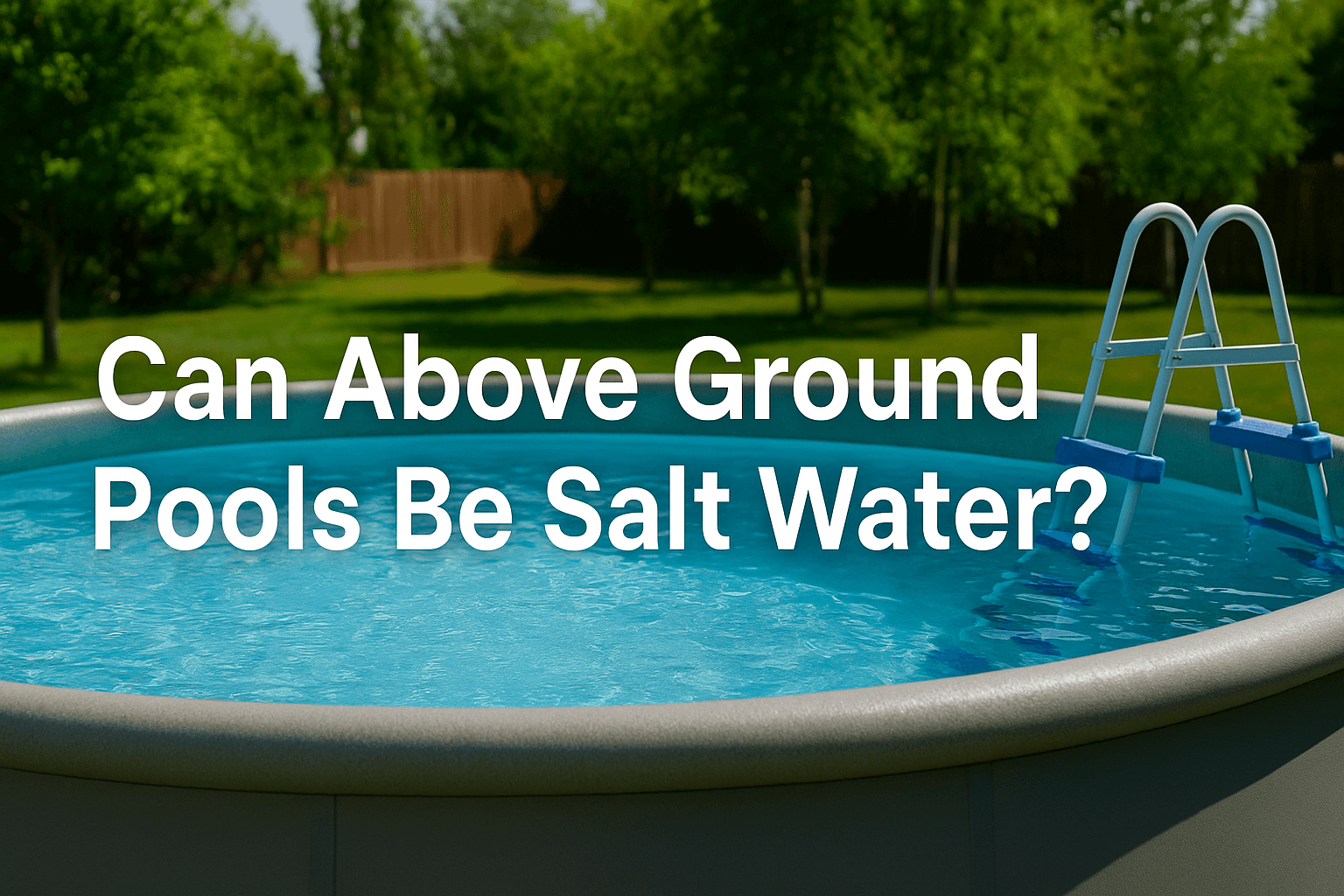
Can Above Ground Pools Be Salt Water?
Can above ground pools be salt water? Absolutely — and they’re a game-changer! Think silky water, no chlorine stench, and happier skin. We’ll cover how it works, what it costs, and which best above ground pools are salt-ready. Curious? Stick around to make the salty plunge the right way.
The Growing Popularity of Saltwater Above Ground Pools
Between juggling work, school runs, and trying to get the kids off screens, life can be hectic. Having a pool in the garden? That’s a slice of calm in the chaos.
And salt water? It’s not just for luxury villas anymore. More UK families are making the switch — especially with modern above ground pools that make it easier than ever.
Benefits of Saltwater Systems for AGPs (Softer Water, Less Irritation)
Saltwater systems are a dream for anyone with sensitive skin or allergies. The water feels silky, and there's far less eye stinging. Your skin and hair won’t dry out as much either, which means fewer post-swim complaints from the little ones.
Once you’ve tried it, regular chlorine feels like a step backwards.
Reduced Reliance on Manual Chlorine Dosing
If you’re used to juggling chlorine tablets and testing strips, you’ll love the hands-off feel of saltwater. A salt chlorinator takes care of most of the heavy lifting. It quietly works away in the background, keeping your pool sanitised day after day.
Less fiddling with chemicals. More time swimming.
Perceived Ease of Maintenance
There’s a reason many pool owners say saltwater is “set it and forget it.” While it’s not zero maintenance, it’s a lot less effort than you might think. With fewer chemical adjustments needed, your weekly to-do list gets shorter.
Bonus? Fewer emergency dashes to the pool supply shop.

How Saltwater Chlorinators Work
The Process of Electrolysis (Converting Salt to Chlorine)
Here’s the science-y bit made simple: saltwater systems use electrolysis. That’s just a fancy word for turning salt into chlorine using a small electrical charge.
No, it’s not magic — but it might feel like it.
Distinction: Still Chlorine, But Generated Differently
Saltwater pools still use chlorine, but it’s made in a gentler, steadier way. There are no harsh spikes in chemical levels. Just a smooth, continuous release that keeps water clean without the harsh smell.
It’s like the difference between sipping tea and downing an espresso shot.
Components of a Salt System (Salt Cell, Control Board)
The system includes a salt cell (where the magic happens) and a control board to manage how much chlorine is produced. Most models let you set and forget, though it’s good to check things now and then.
Think of it like a thermostat — you don’t need to touch it daily, but it’s nice to know it’s there.
Can You Use Salt in Above Ground Pools? Compatibility and Corrosion
Identifying Saltwater Compatible Above Ground Pools
Not every above ground pool is ready to go salty. The type of material your pool is made from really matters.
Importance of Corrosion-Resistant Materials (Resin Frames, Coated Steel, Aluminium)
Resin frames are a top pick — they don’t rust. Coated steel and aluminium are also great options, offering strength without the corrosion risks. These materials stand up well against salt, wind, and good old British rain.
If you’re shopping for a pool, look for the words "saltwater compatible" or "corrosion-resistant".
Checking Manufacturer Warranties and Specifications
Salt water might void your warranty if the pool isn’t designed for it. Always read the small print before making the switch.
Manufacturers often spell out what’s allowed — and what’s not — in their setup guides.
Specific Components Designed for Saltwater Use (e.g., Stainless Steel Skimmer Panels)
Some salt-friendly pools go the extra mile with extras like stainless steel skimmer panels or rust-proof screws. These are worth the extra spend if you want your setup to last.
Salt and metal don’t always get along, so invest where it counts.

Potential Risks of Using Saltwater with Non-Compatible Pools
Accelerated Corrosion of Metal Parts (Ladders, Walls, Screws)
Use salt in a pool not built for it, and you might see rust — fast. Ladders, bolts, screws… all the little bits can corrode surprisingly quickly.
It’s not just cosmetic. Over time, corrosion can damage structural parts.
Damage to Liners or Pool Components Not Designed for Salt
Some liners can fade, stain, or weaken if exposed to salt over time. The wrong fittings can also become brittle or leak-prone.
Using proper salt-rated gear helps avoid costly replacements.
Galvanic Corrosion (When Dissimilar Metals React)
Put two different metals in a saltwater pool and you’ve got a recipe for galvanic corrosion. It’s a slow, sneaky problem — one metal starts breaking down faster than normal.
Using compatible parts and proper bonding helps stop it in its tracks.
Can Above Ground Pools Use Salt Water? Installation & Maintenance
Setting Up a Saltwater System for Your Above Ground Pool
Choosing the Right Size Salt Chlorinator for Your Pool Volume
Bigger isn’t always better — but you do need a chlorinator that matches your pool’s volume. If it’s too small, it won’t keep up. Too big, and you’ll waste money.
Check the box for litres, not just gallons.
Adding Pool-Grade Salt (Recommended Purity and Quantity)
Use high-purity pool salt — the kind made specifically for chlorinators. Not rock salt, not table salt. You’re aiming for around 3,000–4,000 ppm, which is just a fraction of what’s in seawater.
Follow your system’s manual for the exact quantity.
Plumbing Options (Inline, Return Jet, or Drop-in Units)
Salt systems can be installed in a few different ways. Inline units go into your filtration system, while drop-in models hang off the edge. Return jet options fit straight into your pool’s return line.
Choose one that fits your setup and comfort level.

Essential Maintenance for Saltwater Above Ground Pools
Regular Water Testing (Salt Level, pH, Alkalinity, Stabiliser)
Yes, you still need to test your water. But it’s less stressful. Just keep an eye on salt levels, pH, alkalinity, and stabiliser.
A simple test kit or strips will do the trick.
Cleaning and Inspecting the Salt Cell
Salt cells can build up calcium over time. A quick clean every few months keeps it running smoothly.
Don’t wait for problems — prevention’s easier (and cheaper).
Importance of Pool Bonding for Metal Components
If your pool has any metal parts, bonding is essential. It helps prevent corrosion and protects against electric shock.
It’s not complicated — just make sure a pro installs it correctly.
Long-Term Costs and Benefits Analysis
Higher Upfront Investment vs. Lower Ongoing Chemical Costs
Saltwater systems aren’t cheap to start. You’re looking at £1,500–£3,000 for a decent setup. But the running costs? Much lower than constantly buying chlorine.
Over five years, saltwater often wins.
Extended Equipment Lifespan with Proper Care
If you keep up with basic maintenance, your gear will last. Salt systems are built for the long haul — and your water will stay swimmable with fewer hiccups.
It’s less stress, fewer breakdowns, and more time floating on a lilo.
Have you checked out our other posts?
Which Is Better Salt Or Chlorine Above Ground Pools?



Leave a comment